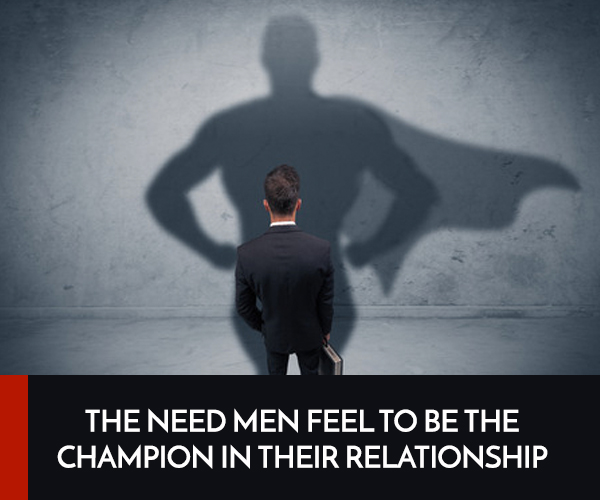
You’re a middle-aged couple, no kids. You’ve decided to put off having children to concentrate first on your education, then on your chosen careers. Sound familiar? It does to me. I recently saw a gentleman in my office for a session about his marriage and what he shared with me bears repeating. It’s nothing too revolutionary, but struck me as this man being able to articulate feelings that a lot of men have shared with me when discussions of roles in relationships come up.
Some history first: My client Victor has been married for over ten years to Stephanie (not their real names). When they first got together their relationship was rather traditional. He worked as a graphic artist while she was in college studying business. They worked and strived and made a home together, decided not to have kids, and continued to work. Fast forward about 6 years and Victor scales back his hours and agreed to help Stephanie launch her own business. In a sense, he’s setting aside his own personal dreams and pursuits to support his wife.
Stephanie is absent from the home more and more as her business takes off, and the marriage begins to suffer. Victor begins to feel confused about what Stephanie wants from him both personally and professionally, and he feels a lack in his life of the things that used to bring him satisfaction and happiness. He is not sure what his current role is and what it means to his wife, and while he wants to support Stephanie in her business and personal life, he misses his old life and has a wish to return to the way things used to be before the waters of marriage got murky. This is where I came in.
Our individual sessions brought up a lot of questions from Victor. I have the answer to many of them, but others will need to be worked out in counseling with both of them. Part of my initial assessment of couples is their expectations and goals for what they want to accomplish through counseling. What I learned from Victor was that he wanted to do so several things. He wanted to rekindle the feelings of happiness, excitement and joy that he and Stephanie shared in the beginning of their relationship. He wanted to clarify his role in the marriage and on the business side of his relationship with Stephanie. He was emphatic and emotional about how much he loves his wife, and how he wants to make things right.
 Victor doesn’t want to feel selfish for pursuing his own personal interests but he can’t help feeling guilty that he’s not 100% committed to his wife. He has been neglecting himself for the sake of Stephanie’s success while she has pursued her own interest away from the home. He supported her striking out on her own and gave up a lot of his own pursuits and is thinking that it’s time to take them back up again. I wholeheartedly agree with this decision. I applaud him for being willing to sacrifice for Stephanie’s happiness, but not at the cost of his own happiness. There is definitely a balance to be struck here, and my job is to help them find that balance.
Victor doesn’t want to feel selfish for pursuing his own personal interests but he can’t help feeling guilty that he’s not 100% committed to his wife. He has been neglecting himself for the sake of Stephanie’s success while she has pursued her own interest away from the home. He supported her striking out on her own and gave up a lot of his own pursuits and is thinking that it’s time to take them back up again. I wholeheartedly agree with this decision. I applaud him for being willing to sacrifice for Stephanie’s happiness, but not at the cost of his own happiness. There is definitely a balance to be struck here, and my job is to help them find that balance.
A man who is happy within himself is a better man, he’s a better friend a better partner, and a better husband. Both parties deserve to follow their dreams and one side doesn’t need to cancel out the other. Both are possible. I encouraged Victor to take up his art again, to allow himself to exercise the creativity that he’s been quashing and to find what it is that he’s passionate about within himself and work on that.
What support does Stephanie need from her man while she’s striking on her own? Victor feels he needs to be Stephanie’s champion and do whatever she needs to feel supported and loved. It’s hard for him to feel like he’s either falling short of that goal, or that Stephanie doesn’t call on him to act as her champion now as much as she did before she was a successful independent business person. As we started to break down these concepts and look at what one partner needs from the other it became clear that what Stephanie needs from Victor, and the best ways that he can champion her as a partner and spouse is not to make assumptions but to take his cues from Stephanie about what she needs. Turns out, he’s not that far off the mark as you’ll see.
What is the best way to love and support your partner? What do they need? From Stephanie: One, to be listened to with an open heart and a listening ear. Two, to be on her side and encourage her not to fix anything but to empathize with her struggles, to be a steadying influence and not to try to fix everything for her (which is where Victor was struggling) but to allow her to be heard. Three; you don’t have to necessarily have all the answers; simply be willing to absorb and explore her questions and challenges with her. You don’t have to solve all her problems; but listen, and be there as her sounding board. You are a team and as team members you build on each other’s strengths. Our biggest strength is having a loyal, caring, emotionally available partner.
 Victor cannot solve everything, but he can be a support and encouragement for Stephanie. Someone she can rely on to be there, to have her back. Once this was established we were able to redefine Victor’s role as “champion”, expanding it to allow him to NOT have to fix Stephanie’s world, but to work on fixing his own. To increase his self-satisfaction with the choices he’s made in life so that he can be that reliable support system for Stephanie.
Victor cannot solve everything, but he can be a support and encouragement for Stephanie. Someone she can rely on to be there, to have her back. Once this was established we were able to redefine Victor’s role as “champion”, expanding it to allow him to NOT have to fix Stephanie’s world, but to work on fixing his own. To increase his self-satisfaction with the choices he’s made in life so that he can be that reliable support system for Stephanie.
Those roles are defined for every couple in a different way. It’s absolutely normal for the man to want to do all of those socially defined gender roles, the protector, the provider, the strong one. Couples are redefining these roles all the time. Don’t let what you think you should be over power what you know you should be. Listen to your intuition, listen to your partner. You just be you, and many of these issues will take care of themselves. The main thing is to love and support each other in your life choices and to encourage and help one another as much as you can. If you’re a happy and well-rounded individual, you bring so much more to the table when it comes to being a good spouse or partner. Self-care is just as, if not more important than caring for someone else. It takes all of this to create a healthy love relationship.
Stuart Fensterheim, LCSW helps couples to overcome the disconnection in their relationships As an author, blogger and podcaster, Stuart has helped couples around the world to experience a unique relationship in which they can feel special and important, confident in knowing they are loved deeply and that their presence matters.
His weekend workshop, Two Days: Seven Conversations has become a popular venue for many to set off on their journey of connectedness. The Couples Expert Podcast consists of weekly provocative conversations offering the perspectives and insight of experts from a variety of relationship related fields. Stuart also offers daily relationship video tips on The Couples Expert YouTube channel.
Stuart practices in Scottsdale, Arizona, where he lives with his loving wife of many years, and their therapy dog, Ollie.
Subscribe to My YouTube Channel
Ask Me a Question
If you have a question, comment, thought, or concern, feel free to comment below. We’d love to hear from you!


Leave A Comment